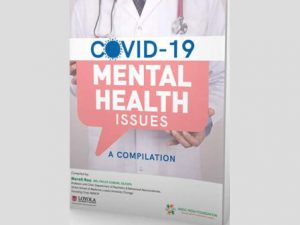COVID-19 and Mental Health Crisis: Changing Realm of Battle
In a world where suddenly masks and sanitizers have become our only friends, questions of job security, economic stability and food insecurity are faced on daily basis, there is complete reversal of what normal feels like. It is more than common to observe our minds being a breeding ground for stress, anxiety and depression.

Every disaster results in deaths, injuries, destruction and damage that are visible to us. However, stress, fear, anxiety and mental agony that it leaves behind remain hardly visible. The survivors of such disasters lose their close ones, suffer damages to their assets and see their societies in utter chaos. While fighting the deadly invisible virus, the decision-makers often forget the invisible impact of the disaster, until these mental disorders transform into prolonged agonies. Mental health concerns are thus the next looming crisis, which will form the second wave of the global pandemic COVID-19.
Psychological issues are seen to be an aftermath of all disasters and they can be documented from the times of Bhopal Gas Tragedy, Latur earthquake, etc.
Manish Mohandas, a programme officer for UNDP India, spoke about disasters from a psychosocial point of view, ‘the impact of it is usually felt at three levels. The first is what an individual’s mind goes through and how it is affected by the pandemic. While the second is at the community level as to how one group undergoes changes, the third is how the disaster unfolds overall. From an individual’s viewpoint, the vastness of the grave reality of the pandemic and the uncertainty of the future creates a mental burden in the minds of all. The paradox of social isolation is that while it is necessary to reduce the spread of infection; however, it increases anxiety, stress and makes every latent fear more manifest. In a world where suddenly masks and sanitizers have become our only friends, questions of job security, economic stability and food insecurity are faced on a daily basis—there is a complete reversal of what normal feels like’ (‘Mental Health Awareness during Covid-19’ UNDP Facebook live session).
Also Read : Non Physician Health Workers Must For Interventional Mental Healthcare
Answering to a question regarding the right coping mechanism during the lockdown situation by Dr Shachi Adyanthaya, Dr Sameer Malhotra, Director, Mental Health & Behavioral Sciences, Max Hospitals explained how we need to look at the positive side of things. We need to make sure that we do not consume only the negative part of the news as it causes a toll on our thought process and emotional health. He further talks about how because of our survival instincts, we tend to magnify the problem in our mind, minimize our coping ability and strengthen the belief that we belittle in front of our pandemic. All of us need to start focusing on how the pandemic has given us more time with family, made us more aware of self-hygiene, brought more creativity among people, provided with stronger coping abilities.
It is more than common to observe our minds being a breeding ground for stress, anxiety and depression. One instance which showcases the gravity of the situation is of a 23-year-old man, who was tested for coronavirus, ended up killing himself by jumping from the seventh floor of a hospital in Delhi. Posthumously, his results proved negative.
The virus has come to occupy even the deepest corners in our mind where even the mere sight of people standing too close sets off a mental alarm.

It is quite hard for our body and mind to grasp the sudden change of reality. Various psychiatrists are tensed that in coming months we won’t be seeing classic cases of post-traumatic stress disorder (PTSD), but in fact more chronic cases.
We are surrounded by information pouring in from all over the globe about increasing deaths and rapid spread of the virus. Many times, this information is fake and doctored leading to a situation of utter confusion, panic and anxiety. In fact, a 35-year old man, who had been seeing WhatsApp messages, became psychotic, aggressive, insomniac and suspicious. He said that the virus would come flying towards him and infect him through his arm. Worried, the Director-General of WHO actually said that we are not just fighting a pandemic, but also an infodemic.
Pandemic is not to be seen as just a medical phenomenon, but also a cause of social dysfunction, where people view their entire community chaotic. This forms the second level of impact of the pandemic. Everything that gave structure to our lives stands disorganized. From our offices being locked, markets shut down, religious institutions closed and our relationship with neighbours and friends at a standstill, we have completely lost the sense of community. This has made people feel lonely, lost and helpless.
Moreover, we see how the economically and socially disadvantaged in our community are suffering from the lack of response to their primary needs. The migrant labour population is jobless, homeless, and unable to reach their villages. The mental impact on the mind of the sufferer is beyond imaginable.
On one hand, the community provides us with a sense of belongingness; on the other hand, it also causes stigmatization. Experiencing a disease in itself can create self-stigma associated with the feelings of guilt and shame of having the disease that you might have passed on to your loved ones. It is already seen during the times of HIV that stigma can be a powerful barrier to delivering prevention, treatment and care to the people who are in most need of it.
The next level of impact talks of the overall social-cultural milieu in which the pandemic unfolds itself. In a national survey released by the American Psychiatric Association (APA) in March, 36 per cent of respondents said that COVID-19 was seriously impacting their mental health and 48 per cent were anxious about getting infected. Another indicator of the current state of mind: online therapy company, Talk space, reported a 65 per cent jump in clients, since mid-February. These numbers are alarming and show us how shaken we all are to the core. Further, in times of socio-economic distress, people decide to self-medicate with intoxicants to deal with mental pressure.
Also Read : Covid 19 In India Immense Role For Healthcare Field Workers
Hence, the odds of drug and alcohol addiction increasing after lockdown are extremely high putting a further strain on the economy and health services.
Furthermore, we saw how economic activities went from a hundred to zero in just a matter of few days, bringing the entire economy to an abrupt halt. It is only obvious that the economic fissures exposed by COVID-19 will cause unemployment, loan defaults, starvation and thousands of people slipping into poverty. Cases of depression and anxiety will rise up shaking the entire socio-cultural structure to its core. Moreover, research states that depression and anxiety disorders are estimated to cost the global economy US$ 1 trillion each year due to loss of productivity. It is also being predicted that this will cause the suicide rate to increase exponentially and history stands as a proof of such instances. In 2008, researchers from the University of Oxford and the London School of Hygiene & Tropical Medicine noted an extra 10,000 ‘economic suicides’ across the US, Canada and Europe, due to the financial crisis caused by the economic hardships post-recession. Other than human suffering, suicide also has an economic dimension, as each death is said to cost INR 265,000 in the first year alone, says a study in the Indian Journal of Psychological Medicine. Hence, it is evident that the mental health of individuals influences the entire nation.
The battle against the microscopic enemy may seem to be outside our homes. However, the struggle to deal with it actually starts with our mind. Various psychiatrists during the period of isolation having recommended coping mechanisms like having a proper sleeping cycle, nutritious food intake, staying physically active and meditation. It is also important for people to talk about how they are feeling and to express their concerns.
(Slider Photo credit: Sandip Karangiya/ @mr_karangia)
